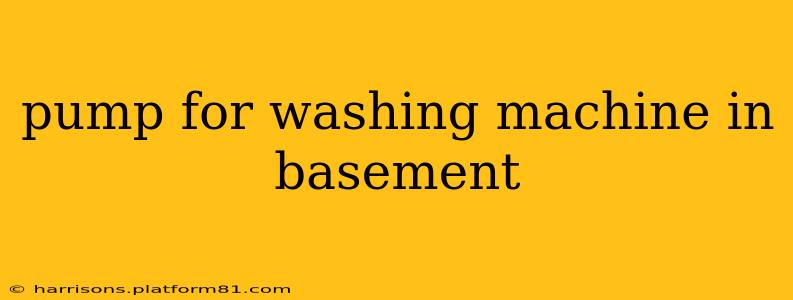Washing machines in basements often present unique plumbing challenges. If your basement lacks proper drainage or suffers from occasional flooding, a dedicated pump can be a lifesaver, preventing costly water damage and ensuring your laundry routine remains uninterrupted. This comprehensive guide will help you navigate the world of washing machine pumps, addressing common questions and concerns to find the perfect solution for your home.
What Kind of Pump Do I Need for My Basement Washing Machine?
The type of pump you need depends largely on your specific situation. Consider these factors:
- Water Volume: How much water do you anticipate needing to pump out? A standard washing machine might only produce a few gallons of wastewater, while a larger capacity or high-efficiency machine may require a more powerful pump.
- Drainage Distance: How far does the water need to travel to reach its discharge point? Longer distances require a pump with more head pressure (the ability to push water vertically).
- Drainage Height: How high does the water need to be lifted? This is another critical factor determining the necessary head pressure. A pump placed low in a basement will need significant lift to reach a drainpipe several feet higher.
- Frequency of Use: How often will you be using the pump? Frequent use might necessitate a more durable and reliable model.
Generally, you'll find two main types suitable for washing machine applications:
- Submersible Pumps: These are designed to be placed directly in the water. They're ideal for situations where water accumulates frequently. They're often compact and efficient.
- Pedestal Pumps: These sit above the waterline and draw water from a nearby sump pit or basin. They're suitable for situations where a consistent water source is available and a submersible pump isn't practical.
What are the Best Pumps for Basement Washing Machines?
There's no single "best" pump, as the ideal choice depends on your unique needs and budget. However, reputable brands known for producing reliable pumps for various applications include:
- Sumo Pumps: Often praised for their durability and power.
- Little Giant: Known for a range of pumps designed for various needs, including wastewater removal.
- Wayne Pumps: A long-standing brand with a reputation for quality and performance.
Remember to check reviews and compare specifications before making a purchase. Pay close attention to the pump's flow rate (gallons per minute), head pressure (feet of lift), and horsepower.
How Do I Install a Washing Machine Pump in My Basement?
Installation can vary depending on the type of pump and your specific plumbing setup. However, generally, the process involves:
- Selecting a Location: Choose a location for the pump that's easily accessible and provides ample space for the pump and any associated plumbing. Ensure it's adequately protected from potential flooding.
- Connecting to the Washing Machine: Securely attach the pump's inlet hose to the washing machine's drain hose.
- Connecting to the Discharge: Connect the pump's outlet hose to your chosen drainage point—this might be a floor drain, a sump pump, or a higher drainpipe.
- Testing the System: Once installed, run a test load of laundry to confirm the pump operates correctly and efficiently removes all wastewater.
It's highly recommended to consult with a qualified plumber, especially if you are unfamiliar with plumbing work. Improper installation can lead to water damage or malfunction.
How Much Does a Washing Machine Pump Cost?
Prices vary significantly based on the pump's power, features, and brand. You can expect to find pumps ranging from around $50 to several hundred dollars. The more powerful and feature-rich pumps generally come at a higher cost.
How Do I Prevent Water Damage in My Basement Besides Using a Pump?
While a pump addresses the issue of existing water, preventative measures can significantly reduce the risk of future water damage. These include:
- Regular Inspections: Regularly check for leaks and signs of water intrusion.
- Proper Drainage: Ensure your basement has adequate drainage to prevent water accumulation.
- Waterproof Your Basement: Consider waterproofing your basement walls and floor to prevent water infiltration.
- Maintain Your Washing Machine: Regular maintenance of your washing machine can prevent leaks and malfunctions.
By carefully considering these factors and consulting with a professional when necessary, you can choose and install the right pump to protect your basement and ensure your washing machine operates without issue.
